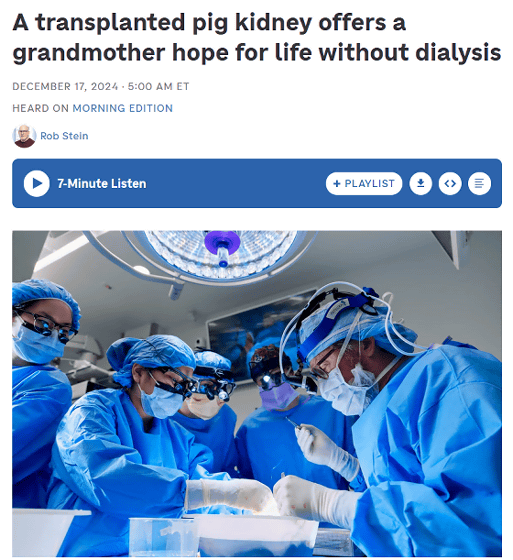The third case in history of 'transplanting a gene-edited pig kidney into a human' has been successful, and the patient has been discharged from the hospital and is doing well.

A 53-year-old woman from Alabama, USA, became the third person in history to undergo a pig kidney transplant into a human. The woman recovered faster than doctors expected and was discharged from the hospital less than two weeks after the surgery.
Surgeons transplant a genetically modified pig kidney into a human : Shots - Health News : NPR

'She was waiting for a 1-in-a-million match': Alabama woman is the 3rd patient to ever get a pig kidney | Live Science
https://www.livescience.com/health/surgery/she-was-waiting-for-a-1-in-a-million-match-alabama-woman-is-the-3rd-patient-to-ever-get-a-pig-kidney
Twanna Looney, 53, who received the pig kidney transplant, donated one of her two kidneys to her mother in 1999, but developed chronic high blood pressure during a pregnancy later in life. In 2016, her remaining kidney stopped functioning, and she has since undergone dialysis three times a week for four hours a day.
Rooney was put on the kidney transplant list in 2017 and given higher priority than the average patient, but finding a kidney that was a good match for her immune system, which has learned through pregnancy and blood transfusions to reject almost all human tissue, has proven extremely difficult.
However, Rooney had another option: to have a pig kidney that had been genetically edited to match human tissue. The US Food and Drug Administration (FDA) made an exception to the requirements for clinical research, allowing Rooney to have a pig kidney transplant.
On November 25, 2024, the third pig kidney transplant surgery in history was performed on Rooney at New York University Langone Medical Center. The photo below shows Rooney before heading to the operating room.

by Joe Carrotta for NYU Langone Health
The pig kidney transplanted into Rooney was developed by the American regenerative medicine company Revivicor. The donor pig had three genes for pig proteins that may activate the human immune system and a gene for a pig growth hormone receptor removed. Six human genes were also added to make the kidney more compatible with the human body.
Revivicor also took special precautions to prevent the virus from infecting the pig kidney from infecting the patient. Additionally, Rooney's immune system had many antibodies that attack human kidneys, but few that could attack the pig's organs.
The kidney transplant was a success, and it was confirmed that the pig kidney, with blood vessels connected to it, was functioning inside Rooney's body. Immediately after the operation, surgeon Robert Montgomery commented, 'It couldn't have gone better,' and 'I'm really pleased at this point. We've only just begun, and there's still a lot of work to be done. But the fact that we've gotten off to a good start is really important.'

by Joe Carrotta for NYU Langone Health
'I have a lot of concerns. I have a lot of hope, but hope is not scientific evidence,' said Sid Johnson, a bioethicist at
Johnson also said he was concerned about the risk of infection from transplanting pig organs, as well as the ethical issues of getting dying patients to consent to the experiment and editing pig genes to fit the human body.
'Our goal is to have an unlimited supply of organs. We're trying to solve the organ shortage crisis. It's all about an unlimited supply of kidneys, hearts and other organs,' said David Ajarres, president and chief scientific officer at Revivicor.

The two previous patients who received pig kidney transplants were already suffering from various health problems and only survived a few weeks or months after the operation, but Rooney is in much better health than his predecessors, so doctors are hopeful he will live longer after the operation.
In fact, Rooney's kidneys were functioning well after the surgery, and she recovered faster than doctors expected, so she was discharged from the hospital less than two weeks after the surgery. At the time of writing, she has moved to an apartment near the hospital and is living with her husband, and will be monitored daily at the hospital for the next three months.
After the surgery, Rooney was able to enjoy a variety of foods and drinks, no longer suffered from fatigue or swelling, and was able to urinate on his own for the first time in eight years. 'I feel amazing,' Rooney told NPR. 'I feel like a whole new person, like I've got a second chance at life.'
In the future, Rooney hopes to return to her part-time job as a cashier and spend more time with her family. Her adult daughter and grandchildren will be coming to visit her apartment for Christmas. 'It's wonderful. It's the best Christmas present in the world,' she said.
Related Posts:
in Science, Posted by log1h_ik







